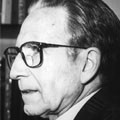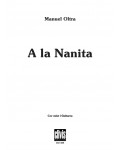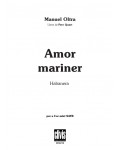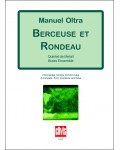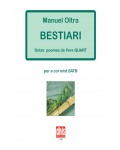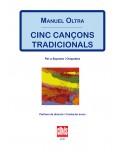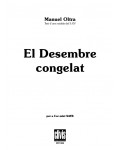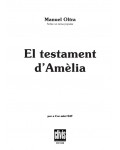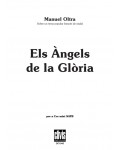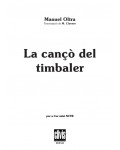
No products
Prices are tax included
Product successfully added to your shopping cart
There are 0 items in your cart. There is 1 item in your cart.
- English
- Castellano
- Català
Manuel Oltra was born in Valencia on 8th February 1922, but moved to Barcelona that same year. He started his musical education at the age of 14 with the maestro Josep Font Sabaté studying intensely despite the difficulties inherent to the Civil War. On joining the army in 1943, he was forced to move to Ceuta where he very soon got a job as a teacher at the Hispanic-Moroccan Conservatory in Tetuán. Three years later he returned to Barcelona, where he embarked on his full musical career as a pianist, conductor and composer.
In 1957 he took the official course at the Conservatori Superior Municipal de Música in Barcelona and immediately afterwards became an assistant professor and, later, already a professor of harmony, counterpoint and musical forms, he was appointed as the centre's assistant director.
His output as a composer is extensive and varied, ranging from chamber work for several ensembles, symphonic works, a cappella choral or instrumental accompaniment works, children's cantatas, works for cobla (Catalan orchestra) including the extraordinary Rapsòdia per a Piano i Cobla (1953), the first ever work for this instrumental formation. The harmonisation of traditional songs and ballets also constitutes a considerable corpus in Manuel Oltra's work.
In 1994 he was awarded the National Music Prize in the Composition section and National Popular and Tradicional Culture Prize in the Music section by the Generalitat de Catalunya.
-
-
-
Berceuse et rondeau
Edition: DigitalThis work of Manuel Oltra is composed by two independent parts, which respond to two different rhythmic atmospheres. The first is a lullaby, and the second a rondo.
11,05 € -
-
Bestiari (12 poemes de Pere Quart)
Edition: DigitalThese pieces have been written with an unusual language of Manuel Oltra, making them unique; over the years have gained a great recognition by the best choirs in Catalonia.
18,15 € -
Bestiari (12 poemes de Pere Quart)
Edition: PrintedThese pieces have been written with an unusual language of Manuel Oltra, making them unique; over the years have gained a great recognition by the best choirs in Catalonia.
26,00 € -
Cinc cançons tradicionals
Edition: DigitalThe chamber work is exquisite and though initially it may seem unusual, the voice is treated as just another instrument which Oltra interweaved naturally with the other timbres.
17,85 € -
-
-
-
-

